Prisons are supposed to ensure safety, maintain order, and rehabilitate those in custody. But in Georgia, they do the opposite—turning facilities into war zones where violence isn’t just common, it’s inescapable!
At the core of this chaos is Georgia’s broken classification system, which fails to separate violent offenders from vulnerable inmates. Instead of assessing risk properly, the system relies on a dysfunctional disciplinary process, where real threats are ignored while non-violent infractions get all the attention.
What are the results of these dysfunctional systems:
- Violent offenses, including stabbings and assaults, often go undocumented—meaning violent inmates remain classified as low or medium security.
- Gangs manipulate the system to place their own members together, strengthening their control over entire dorms and making them more powerful.
The U.S. Department of Justice has already condemned Georgia’s prison system for its deliberate indifference to violence and abuse. Its investigation found that prison officials routinely ignore safety risks, allow unchecked gang control, and fail to separate violent offenders from vulnerable inmates.1
Instead of protecting prisoners, Georgia’s classification system ensures that violence thrives.
This article will expose:
- How Georgia’s classification system puts the wrong people in the wrong places—fueling violence.
- How a broken DR system keeps people classified incorrectly.
- How DOC staff use group punishment to run the prisons.
Georgia’s prison system isn’t just broken. It’s designed to fail. And that failure costs lives every single day.2
How a Broken Classification System Fuels Violence
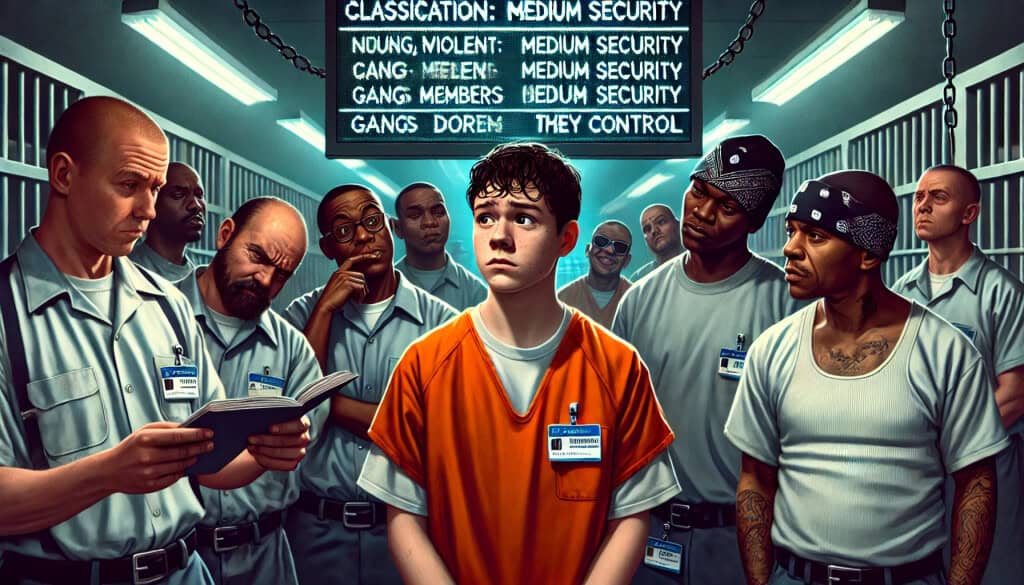
In a properly functioning prison system, classification is the foundation of security, safety, and rehabilitation. Inmates should be housed based on risk level, behavior, and rehabilitation potential—ensuring that high-risk or violent offenders are kept separate from those who are vulnerable.
But in Georgia’s prison system, classification is a disaster—not just through deliberate indifference, but also through sheer neglect and incompetence. Prison officials routinely fail to classify inmates correctly, simply because no one cares enough to do their job.
The result? A system where dorm assignments are completely random, and inmates are thrown into dangerous environments without regard for safety.
How Classification is Supposed to Work
Most prison systems follow basic security principles to ensure safety:
✔ Low-risk offenders are placed in minimum or medium-security dorms or prisons with access to work details and rehabilitative programs.
✔ Repeat violent offenders and gang members are placed in high-security dorms or prisons with tight restrictions.
✔ Vulnerable inmates—such as the elderly, disabled, or those at risk for assault—are separated from known predators.
🔹 Other states use a risk-based system to protect inmates.
- New Jersey and California classify inmates using objective risk factors instead of arbitrary disciplinary actions.
- New York mandates independent oversight of classification decisions to prevent abuse.
Georgia does none of this. Instead, prison officials fail to apply proper classification methods, allowing violence, extortion, and gang control to flourish.
The Reality in Georgia: A Classification System Built for Failure
Georgia’s classification system doesn’t assess risk—it manufactures it. Instead of housing inmates where they belong, classification is driven by:
✔ A Broken Disciplinary Report (DR) System
- Georgia’s Next Generation Assessment (NGA) system which assigns classification levels relies on DRs to determine classification, but staff rarely issue DRs for real violence—especially for gang members.
- Without accurate records of violent behavior, dangerous inmates remain classified as low or medium security, keeping them at medium security prisons instead of close security.
✔ Prison Assignments Based on Available Beds, Not Security Needs
- Georgia operates 34 state prisons and contracts with 4 private prisons, but there aren’t enough beds in close-security prisons to house all high-risk inmates.
- As a result, close-security inmates are frequently placed in medium-security prisons, creating an unpredictable mix of inmates with wildly different risk levels.
- Within a Georgia prison, all dorms are equal. There is no attempt to separate more violent prisoners from non-violent prisoners. Nor do they try to separate gangs. At most there may be a designated dorm for older prisoners, but they often place young inmates that they can’t control in these dorms under the auspices that the older prisoners will keep them in check.
✔ Random Dorm Placements Due to Overcrowding
- Even within a single prison, dorm assignments are completely random.
- Violent offenders are always placed in the same dorm as a nonviolent inmates—simply because that’s where a bed was available.
- The classification system may “assign” an inmate correctly, but due to overcrowding, placements rarely match security levels.
✔ Gangs Use the System to Consolidate Power
- Gangs make use of the broken classification system to place their members together.
- This allows them to dominate entire dorms, recruit new members, and expand their control over contraband, extortion, and prison politics.
- Because dorms aren’t separated by classification level, gang members end up concentrated in certain dorms, turning them into danger zones for weaker inmates.
Example: The Price of Misclassification
At one Georgia prison, two inmates were held captive by gang members for weeks:
- They were tied up under their bunks for days at a time.
- They were not allowed to leave their dorm—even to eat.
- They were beaten, extorted, and humiliated daily.
When prison staff finally discovered them, they didn’t punish the perpetrators. Instead, they put the victims in solitary confinement “for their protection.”
The gang members? They stayed in general population—free to target their next victims.
This is not an isolated case. Across Georgia, prisoners who should be separated from danger are thrown into violent dorms—and when they are inevitably attacked, they are punished instead of protected.
This isn’t a mistake—it’s a system designed to keep inmates trapped in violence.
📌 The DOJ has already condemned this practice.
- The DOJ’s investigation into Georgia’s prisons found that staff deliberately ignore inmate safety risks, failing to separate violent offenders from vulnerable prisoners.
- The report concluded that prison officials’ inaction has directly led to increased violence, abuse, and even deaths.
Yet despite these findings, Georgia DOC has made no effort to change its classification system or the DR system that the classification system relies on.
The Broken Disciplinary Report (DR) System
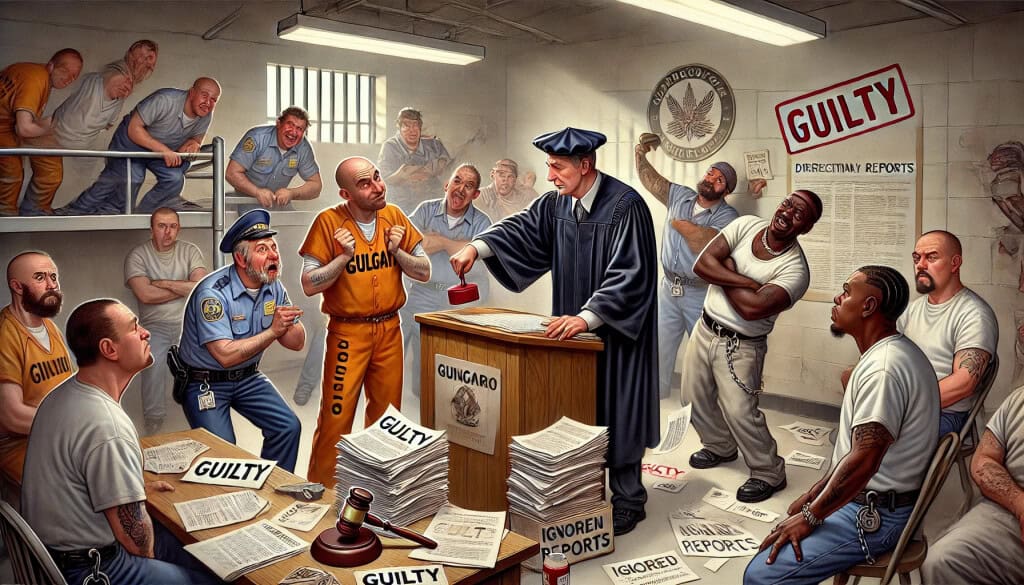
The Georgia Department of Corrections claims that its Disciplinary Report (DR) system is designed to enforce order and maintain safety. In reality, the system is broken beyond repair—punishing the weak while shielding the dangerous.
The Next Generation Assessment (NGA) system used by the GDC relies heavily on DRs to classify inmates and determine security level, work eligibility, and housing placement—as it should. But because officers aren’t writing DRs for violent behavior—classification data is fundamentally flawed.
Why the DR System Fails to Report Real Threats
✔ Stabbings and serious assaults are often ignored.
- Officers fear retaliation from gangs and prefer to look the other way.
- Violent gang members rarely receive DRs—keeping them classified as “medium security” instead of being moved to high-security units.
✔ DRs are disproportionately issued for minor rule violations.
- Most DRs are written for petty infractions, such as:
- Not standing for count
- Sleeping through a callout
- Not having a shirt tucked in
- These minor infractions affect classification more than actual violent behavior because they are written far more often, skewing the system.
✔ The system creates “paper criminals” instead of tracking real threats.
- A prisoner who has never committed a violent act may have 20 DRs for minor infractions—marking him as “high-risk.”
- Meanwhile, a gang member with multiple stabbings but no DRs remains classified as low-risk.
A Sound Policy That Fails in Practice3
On paper, Georgia’s disciplinary process appears to ensure fairness and due process. According to Standard Operating Procedure (SOP) 209.01, inmates must be notified of infractions promptly, have access to a disciplinary hearing, and be allowed to present a defense. The SOP also states that DRs should be used to track rule violations and maintain institutional order.
But in practice, this system fails at nearly every stage.
- DRs are rarely written for serious violence, allowing gang members to attack others without consequences.
- When DRs are written, the adjudication process is often rushed, biased, or outright ignored.
- Many procedural safeguards outlined in the SOP are simply not followed, rendering the entire process meaningless.
Example: A Hearing Without Due Process
At one Georgia prison, an inmate was pulled from the chow line and told to “come to court.”
• He had no idea what charges he was facing.
• He had no advocate, no time to prepare, and no ability to present a defense.
• The Disciplinary Hearing Officer (DHO) glanced at the report, declared him guilty, and sentenced him to 30 days without phone, visitation, or commissary.
This was not an isolated incident—inmates across Georgia’s prison system report similar abuses. The DR process, which should ensure fairness, has instead become a tool to maintain control and suppress grievances.
📌 The Disciplinary Report system isn’t flawed on paper—it’s flawed in execution. And until Georgia enforces its own policies, the DR process will remain a tool of oppression rather than a system of justice.
Group Punishment: When Inmates Are Forced to Police Each Other
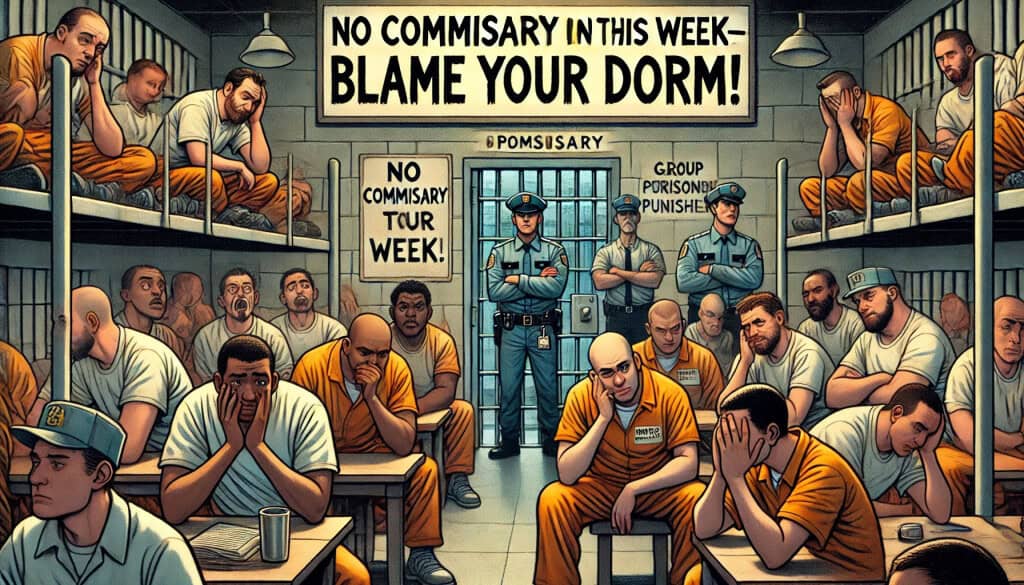
When officers fail to enforce discipline, violence doesn’t stop—it just shifts responsibility onto inmates.
Instead of punishing individual rule-breakers, Georgia wardens use group punishment to force inmates to control each other—creating an environment of fear, distrust, and brutal retaliation.
1. How Group Punishment Works in Georgia Prisons
✔ If one prisoner isn’t ready for inspection, the entire dorm is locked down or loses store (commissary).
✔ If a gang member stabs another inmate, the entire dorm is placed on lockdown.
📌 Example: The Inspection That Turned Deadly
At one Georgia prison, a single inmate wasn’t ready for inspection. Instead of punishing him, the warden locked down the entire dorm—120 men confined to their cells for a full week.
The result was predictable: prison justice.
When the lockdown ended, the inmate responsible was brutally beaten—not by officers, but by other inmates who had suffered alongside him.
2. Why Group Punishment Leads to More Violence
✔ Inmates turn on each other.
✔ Gang leaders enforce order, punishing perceived “rule-breakers” with violence.
✔ Weaker inmates become targets, beaten for mistakes they didn’t make.
✔ Officers avoid responsibility, knowing inmates will regulate themselves.
Georgia doesn’t use discipline to stop violence—it creates more violence by forcing inmates to police each other.
Retaliation and the Absence of Real Accountability
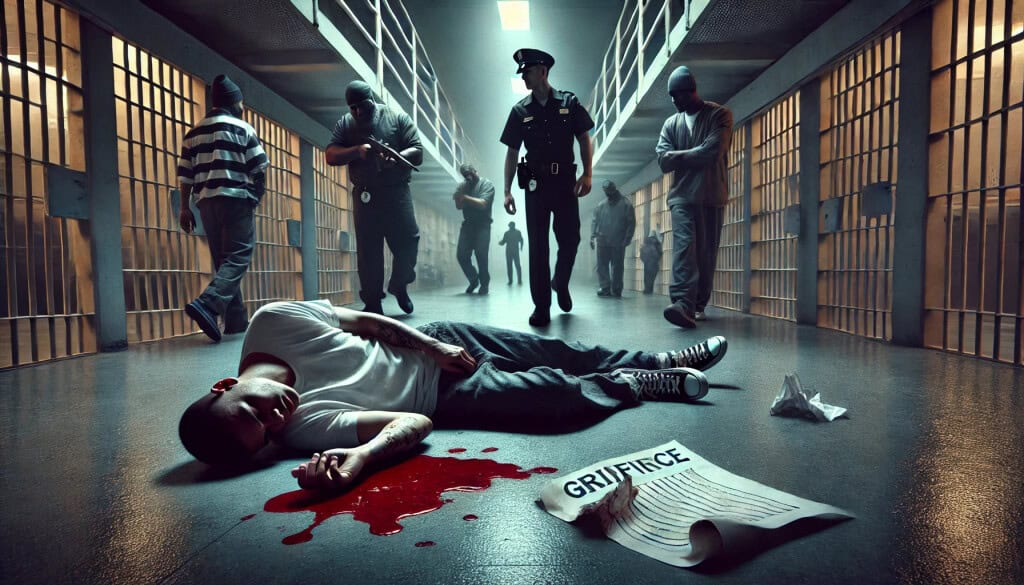
Georgia’s failure to discipline violent offenders doesn’t just allow violence to thrive—it actively punishes those who speak out against it. When inmates report stabbings, assaults, or extortion, they are often the ones who suffer the consequences—not the perpetrators.
Instead of taking action to protect victims, prison officials use retaliation as a tool of control, ensuring that inmates remain silent rather than challenge the status quo.
1. How Retaliation Silences Victims
✔ If an inmate reports a stabbing, he may be sent to the hole—for his “protection.”
✔ If an inmate files a grievance, he may receive a bogus DR in response or simply transferred to a more dangerous prison without any oversight.
Example: Stabbed 5 Times and Thrown in the Hole
An inmate at Hancock State Prison was recently stabbed five times by gang members. He lay in his cell, bleeding, for over three hours before staff responded.
Instead of getting medical care, he was thrown into the hole—while his attackers remained in general population.
The prison refused to call an ambulance, even when the inmate begged his mother to contact the sheriff’s office. No DR was issued against the attackers. No charges were filed.
Georgia deliberately chooses not to report prison violence—protecting the system rather than the victims.4
The massive violence in Georgia prisons looks bad to the public, so Wardens and administrators try to cover it up.
How DOC Staff Weaponize Disciplinary Reports (DRs) Against Inmates
Instead of issuing legitimate DRs for violent offenses, prison officials sometimes use false or retaliatory DRs to punish inmates who:
✔ File grievances against officers or the administration.
✔ Attempt to report abuse, extortion, or violence.
Because DR hearings are a rubber-stamp process, an inmate who files a grievance can be punished through a retaliatory DR, making it look like they are the problem—not the staff or gangs.
🔹 Example: A Grievance Leads to Solitary Confinement
An inmate at Macon State Prison filed a grievance after being extorted by gang members who were controlling access to showers and phones.
- Days later, he was issued a DR for “disruptive conduct” and moved to solitary confinement.
- The gang members who had been extorting him faced no consequences.
The disciplinary system is being used to suppress complaints, not to enforce order.
Gangs Thrive When Staff Refuse to Act
Georgia’s failure to punish real violence doesn’t just harm individuals—it strengthens gang control.
✔ When gang-related stabbings go undocumented, violent offenders remain classified as medium security instead of close security.
✔ When victims are punished for speaking out, gangs become even more powerful—knowing that the system will protect them.
✔ When staff fear retaliation from gangs, they allow violence to continue unchecked.
Georgia’s prison system isn’t just failing to stop gang violence—it’s enabling it.
How Georgia’s System Compares to Other States
| State | Reforms |
| New York | Requires all serious assaults in prison to be investigated by an outside agency. |
| California | Mandates that any attack requiring hospitalization must result in criminal charges. |
| New Jersey | Eliminated the use of group punishment in prisons. |
| Georgia | Protects violent offenders while punishing victims. |
📌 Georgia is one of the worst states in the country for using DRs to control, silence, and punish inmates without due process.5
📌 While other states have introduced oversight mechanisms, Georgia continues to allow its prisons to operate unchecked—ignoring violence, punishing the innocent, and leaving gangs in control.
Fixing Georgia’s Broken Prison System
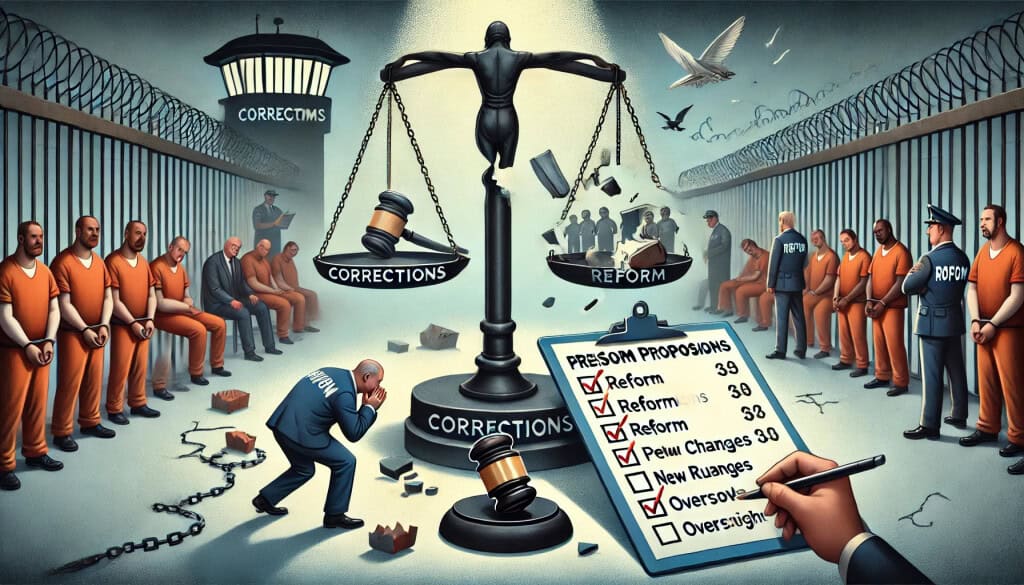
Georgia’s prison system isn’t failing by accident—it’s failing because violence is ignored, discipline is misused, and accountability is nonexistent. The SOP already provides guidelines for a fair disciplinary process, but those rules are not enforced.
If Georgia’s Department of Corrections (DOC) refuses to follow its own policies, then legislative and external intervention is necessary.
1. End Group Punishment—Hold Individuals Accountable
✔ Ban the practice of punishing entire dorms for the actions of a few inmates.
✔ Ensure that sanctions apply only to the individuals responsible for infractions.
✔ Make DOC administrators accountable for misusing collective punishment as a control tactic.
2. Enforce the Existing Disciplinary Process—End Rubber-Stamp Hearings
✔ Mandate adherence to SOP 209.01, ensuring that disciplinary reports are handled fairly.
✔ Require documentation that inmates receive DRs at least 24 hours before their hearing.
✔ Ensure that all inmates have access to a staff advocate and can call witnesses.
✔ Prohibit hearing officers from rubber-stamping guilty verdicts without considering evidence.
3. Require Mandatory DRs for All Violent Offenses
✔ Every stabbing, assault, or gang-related attack must result in a DR.
✔ Wardens should be required to review all violent incident reports to ensure proper documentation.
✔ Failure to issue a DR for violent behavior should result in disciplinary action against staff.
4. Ensure That Violent DRs Trigger Criminal Charges
✔ Any DR involving a violent assault should be automatically referred for criminal prosecution.
✔ Wardens should not have discretion to ignore or suppress criminal referrals.
✔ Prison staff who fail to report violent incidents should face disciplinary consequences.
5. Implement Independent Oversight for DR Appeals
✔ Appeals should not be handled by the same prison staff who issued the DR.
✔ An external oversight board should review major DR cases to prevent retaliation.
✔ Inmates should have the right to present additional evidence during appeals.
The Bottom Line: Enforce the Rules or Overhaul the System
Georgia already has policies in place to ensure fair discipline and safety in prisons—but these policies mean nothing if they are ignored.
✔ If DOC staff refuse to follow the SOP, independent oversight must be created.
✔ If violence is ignored, external law enforcement must intervene.
✔ If group punishment continues, administrators must be held accountable.
The current system is designed to keep violence invisible and inmates powerless. Until accountability is enforced, Georgia’s prisons will remain in chaos.
A Call to Action: Demand Change with Impact Justice AI

Georgia’s prison system won’t change on its own. For decades, violence has been ignored, discipline has been misused, and accountability has been nonexistent. The DOC refuses to enforce its own policies, allowing gangs to thrive while punishing victims.
This deliberate indifference to safety and justice can only be fixed if people demand change.
That’s where you come in.
Use Impact Justice AI to Take Action
📢 What is Impact Justice AI?
Impact Justice AI is an advocacy tool designed to help people take action quickly and effectively.It provides professional computer generated messages based on real data and investigative reports.
✔ Send messages directly to legislators, demanding reform.
✔ Contact the media to expose the crisis inside Georgia prisons.
✔ Reach out to the DOC and parole board, pushing for accountability.
You don’t have to be an expert to make a difference—Impact Justice AI makes it easy.
How to Use Impact Justice AI in Three Simple Steps
1️⃣ Select a Topic
Choose from pre-set topics like:
• Prison disciplinary reform
• Group punishment
• The parole system
• Misclassification of inmates
2️⃣ Customize Your Message
• Personalize the message with your own experiences or concerns to make it more impactful.
3️⃣ Send It to Decision-Makers
• Your message will be sent directly to legislators, DOC officials, and media outlets—ensuring that your voice is heard.
Advocacy Doesn’t Stop at One Message
📝 To be effective, advocacy must be persistent. Legislators need to hear from you multiple times about different aspects of the prison crisis.
✔ Message them weekly—each time focusing on a different issue.
✔ Tag officials and media on social media to bring attention to Georgia’s failures.
✔ Encourage others to use Impact Justice AI—the more people who speak up, the harder it is to ignore.
📌 Silence enables corruption. Your voice can help expose it.
Take Action Now
➡️ Go to ImpactJustice.AI and start advocating for change today.
➡️ Share this article to educate others about the real crisis inside Georgia’s prisons.
➡️ Contact your legislators—demand that DOC follows its own policies and stops enabling violence.
The prison system is broken because those in power want it that way. Make them answer for it.
Because if we don’t fight for justice, how many more inmates will Georgia throw away?
- U.S. DOJ Report on Georgia Prisons ↩︎
- The names of prisoners in this article have been withheld for their protection, as the Georgia Department of Corrections has a documented history of retaliating against those who speak out. However, the accounts presented here are real and are consistent with the findings of the U.S. Department of Justice’s investigation into Georgia’s prison system. ↩︎
- SOP 209.xx ↩︎
- GDC Statistics from their annual report ↩︎
- Prison Policy Initiative ↩︎

My son went through Kangaroo Court, He was wrongfully convicted convicted I have been fighting for him to come home for almost 10 years. I need help and can’t seem to find it. The judicial system is so corrupt all the way up to the governor need help please
Thank you for sharing your son’s story. You are absolutely right—the judicial system in Georgia is corrupt from top to bottom, and wrongful convictions happen far too often. No one should have to fight for a decade just to bring home someone who never should have been imprisoned in the first place.
While we can’t provide direct legal assistance, here are some steps that may help:
1️⃣ Submit Your Son’s Story – We encourage you to share his case with us at https://gps.press/story-submission/ so we can help amplify it and expose the injustice.
2️⃣ Push for Action – Use Impact Justice AI (https://ImpactJustice.AI) to contact legislators and media outlets. The more people who speak out, the harder it is for them to ignore these wrongful convictions.
3️⃣ Legal Advocacy – Have you reached out to the Georgia Innocence Project (https://www.georgiainnocenceproject.org)? They specialize in wrongful conviction cases and may be able to help.
You are not alone in this fight. We stand with you and will continue to expose the corruption that keeps innocent people behind bars. Keep fighting, and know that your voice matters! 💪🔥
My son is at dodge state prison ‼️he has no violence, but he’s been placed in a dorm with all blood gang members have been there 10+ years for murder and violence, and the officer who runs the dorm is also a gang member. I’m being extorted. My son doesn’t wanna live anymore. he is treated so horrific.‼️ i’m scared to death for his life. He’s a white 30 year old civilian and the things that have happened in the last 4 1/2 years has not only bankrupt me trying to save his life from the extortion and then trying to drown him in the toilet and many other things the violet does not get discipline at all‼️ i’m at my wits end on what to do. I have tried everything. The corruption is so deep the warden at Rogers done. My son is so dirty. I having him move there about three weeks ago because I was making was calling because my son had a broken jaw, they would not see him. She was one of the most corrupt people I have ever known. I have never seen anything like this I’m praying for all the people that are in these corrupt prisons that they come home and live and can live a life because the corruption is brutally taken their life away. Someone please help us‼️‼️‼️